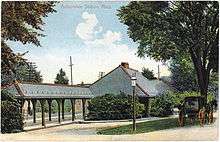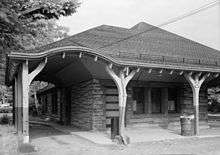Auburndale (MBTA station)
AUBURNDALE | ||||||||||||||||||||||||||
|---|---|---|---|---|---|---|---|---|---|---|---|---|---|---|---|---|---|---|---|---|---|---|---|---|---|---|
|
An outbound train stopped at Auburndale in May 2012 | ||||||||||||||||||||||||||
| Location |
477 Lexington Street Auburndale, Massachusetts | |||||||||||||||||||||||||
| Coordinates | 42°20′45″N 71°15′01″W / 42.3458°N 71.2503°WCoordinates: 42°20′45″N 71°15′01″W / 42.3458°N 71.2503°W | |||||||||||||||||||||||||
| Owned by | MBTA | |||||||||||||||||||||||||
| Line(s) | ||||||||||||||||||||||||||
| Platforms | 1 side platform | |||||||||||||||||||||||||
| Tracks | 2 | |||||||||||||||||||||||||
| Connections |
| |||||||||||||||||||||||||
| Construction | ||||||||||||||||||||||||||
| Parking |
35 spaces ($4.00 daily) 2 accessible spaces | |||||||||||||||||||||||||
| Bicycle facilities | Racks available | |||||||||||||||||||||||||
| Other information | ||||||||||||||||||||||||||
| Fare zone | 2 | |||||||||||||||||||||||||
| History | ||||||||||||||||||||||||||
| Opened | Early 1850s[1] | |||||||||||||||||||||||||
| Closed | January 30 - March 16, 1981 (temporary)[2] | |||||||||||||||||||||||||
| Rebuilt |
1881 (H. H. Richardson depot) 1961 (modern station) | |||||||||||||||||||||||||
| Traffic | ||||||||||||||||||||||||||
| Passengers (2013) | 325 (weekday inbound average)[3] | |||||||||||||||||||||||||
| Services | ||||||||||||||||||||||||||
| ||||||||||||||||||||||||||
Auburndale is a regional rail station on the MBTA Commuter Rail Framingham/Worcester Line, located next to the Massachusetts Turnpike in Auburndale, Massachusetts near Lasell College. The modern bare station platform, built in 1961, replaced a highly acclaimed 1881 depot building designed by H. H. Richardson. Commuter service at Auburndale is oriented towards rush hour service, but a handful of off-peak locals stop as well, as do all weekend trains.
History
Opening


The Boston and Worcester Railroad opened the segment from West Newton to Wellesley Hills in July 1834.[4] A second track was added in 1839, and in 1843 the railroad began offering season fares for around $60, making it one of the first commuter rail systems.[4] Due to the popularity of the other Newton stops, a station at Auburndale was opened in the early 1850s.[1] The depot was located on the south side of the tracks in a large open area at the intersection of Auburn Street, Lexington Street, and several other roads.[5] In 1867, the Boston & Worcester joined with the Western Railroad to become the Boston & Albany Railroad.[4]
H.H. Richardson depot
Beginning in 1881, the Boston & Albany began a massive improvement program that included the building of over 30 new stations along its main line as well as the Highland Branch, which it bought in 1883. Acclaimed architect H. H. Richardson was hired to design several stations (eventually nine) along the line, starting with Auburndale. Although not as grand as some of his other B&A works like Framingham and Palmer stations, the Auburndale station's design was highly praised. Henry-Russell Hitchcock called it "the best he ever built" in The Architecture of H.H. Richardson and His Time, and a 1904 architecture journal claimed that Richardson's depots at Auburndale and Chestnut Hill "created a new standard of way-station construction."[6][7]
The 1881 station was constructed in Richardson's signature Richardsonian Romanesque style, with influence from Japanese architecture as well as Romanesque Revival architecture. The one-story building was built from "red and light grey granite", with "heavy masonry and dominant roof."[6] The interior was divided into a pair of waiting rooms for men and women, with a ticket counter between.[8] The platform was shaded by a canopy, which wrapped around the east end of the building into a porte-cochère.[6][7] Construction, by the Norcross Brothers firm, cost $16,290.[8] As with a number of other stations on the line, Frederick Law Olmsted designed the landscaping, which included large trees, shrubs, and Japanese ivy.[6][7][8] A replica of the station, still standing, was built by the Buffalo, Rochester and Pittsburgh Railway in 1911 in Orchard Park, New York.
Demolition and modern era
Despite the accolades, H. H. Richardson's depot was torn down in 1961 after 80 years in service. The extension of the Massachusetts Turnpike from Route 128 to downtown Boston involved removing two of the line's four tracks from Auburndale to downtown. The historic stations at Auburndale, West Newton, Newtonville, Newton Corner, and Brighton were demolished; only the Allston depot survived. Auburndale, West Newton, and Newtonville stayed in service, but with extremely diminished facilities – bare asphalt platforms with simple metal shelters. The single side platform provides access to only one of the line's two tracks; passengers use short asphalt strips to access trains on the other track. The 1961-built platform stretches from Woodland Street to Auburn Street, just west of the previous station locations.
The station was temporarily closed on January 30, 1981, as part of a series of service cuts due to a budget crisis. After six weeks without service, the station reopened on March 16, 1981.[2]
Planned renovations
The bare platform and steep metal stairs make Auburndale station inaccessible to handicapped persons. In the future, the station is planned to be rebuilt with a high-level platform and elevators or ramps to street level to meet ADA guidelines.[3] In April 20004, the Boston Regional Metropolitan Planning Organization voted to add $368,000 (funded by a federal earmark) for planning Auburndale renovations to its 2004-2008 spending plan.[9] However, the project was not pursued at that time.
Beginning in 2008, Representative Barney Frank secured $3 million in funding for design of the replacement station. 30% design plans were released in July 2013, at which point construction was estimated to cost $11.5 million. The 30% plans called for a single high-level side platform on the north side of the tracks.[10] However, that design would still have only provided access to one of the line's two tracks, thus limiting the amount of service that could stop at Auburndale.
MBTA Bus connections
Auburndale is served by two MBTA Bus routes which run on Commonwealth Avenue (Route 30) and Lexington Street to the north:
- 505 Express Bus Central Square, Waltham - Downtown via Moody Street
- 558 Riverside – Downtown Boston via Newton Corner & Turnpike
References
- 1 2 Humphrey, Thomas J. & Clark, Norton D. (1985). Boston's Commuter Rail: The First 150 Years. Boston Street Railway Association. p. 22. ISBN 9780685412947.
- 1 2 Belcher, Jonathan (19 March 2016). "Changes to Transit Service in the MBTA district 1964-2016" (PDF). NETransit. Retrieved 3 April 2016.
- 1 2 "Ridership and Service Statistics" (PDF) (14 ed.). Massachusetts Bay Transportation Authority. 2014. Retrieved 3 April 2016.
- 1 2 3 Karr, Ronald Dale (1995). The Rail Lines of Southern New England. Branch Line Press. pp. 279–280. ISBN 0942147022.
- ↑ J.B. Beers & Co. (1874). "Newton 1874: Auburndale". Atlas of Newton, 1874. WardMaps LLC. Retrieved 31 July 2012.
- 1 2 3 4 Cummings, Abbott L. & Overby, Osmund R. (March 1961) [January 1960]. "Photographs: Written Historical and Descriptive Data" (PDF). Boston & Albany Railroad Station, Auburndale, Middlesex County, MA. Historic American Buildings Survey, Engineering Record, Landscapes Survey.
- 1 2 3 Charles Mulford Robinson (6 February 1904). "A Railroad Beautiful". American Architect and Building News. 83 (260): 1–4. Retrieved 31 July 2012.
- 1 2 3 Ochsner, Jeffrey Karl (1984). H.H. Richardson, Complete Architectural Works. MIT Press. p. 242.
- ↑ "Boston MPO Action items" (PDF). TRANSreport. Boston Regional Metropolitan Planning Organization. May 2004. p. 2. Archived from the original (PDF) on 16 January 2011.
- ↑ Jones, Trevor (18 July 2013). "MBTA looking at new Newton commuter rail station for Auburndale". Wicked Local. Retrieved 3 April 2016.
External links
| Wikimedia Commons has media related to Auburndale (MBTA station). |
- MBTA - Auburndale
- Auburn Street entrance from Google Maps Street View
- Woodland Road entrance from Google Maps Street View